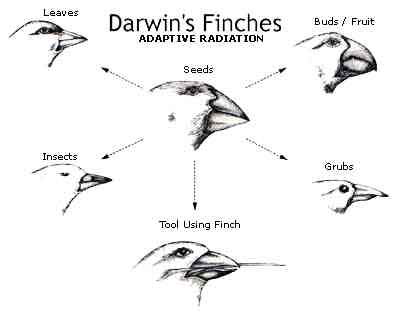If you haven’t read The Beak of the Finch: A Story of Evolution in Our Time you need to put it on your reading list. Immediately. Do it over your holiday break. Then come back and share your thoughts and insights.
I was going to write a long post reflecting on the wonders contained within, but decided against giving all the secrets away. However, I will say that it’s an amazing book that discusses life in terms of evolutionary biology. The main theme is “evolution in action,” viewed through the eyes of a research team that spent decades rigorously observing and meticulously recording the lives of finches on the Galapagos Islands. From chronicling the minute changes, such as a small percentage change in beak depth, for instance, roughly 0.5 mm, they watched as some birds lived and some died. The effects were seen immediately in the next generation, as the birds took after the survivors.
I couldn’t help myself; I summarized those points that really stuck with me below. Spoiler alert!
Evolution is described in terms of the adaptive landscape: there are mountains and valleys, where the mountaintops correspond to specialization (and monopoly) over a certain food source / lifestyle, and the valleys correspond to near-term extinction. An ecosystem can only support as many species as mountaintops are present in the adaptive landscape: each species needs a niche or eventually one species will lead to the extinction of the other in times of scarcity and hardship. As the landscape changes, species adapt to claim their niche and as the species effect the landscape it too changes form; hence, evolution is never-ending and omnipresent.
Evolution-in-action is described as responsible for “wobbling” species; we can’t see evolution because the species are rapidly evolving back-and-forth, stuck in an evolutionary loop as the adaptive landscape minutely cycles without further disruption. Further, it draws an apt comparison between the relation between Newtonian and quantum physics and the relation between fossil records and live evolutionary studies. For large magnitudes, Newtonian physics approximate physics exactly enough, but peering closer into quantum mechanics you’ll find far more detail. The same goes for fossil records, which the public consider the primary evidence of evolution; however, if you peer closer, there is abundant evolution-in-action occurring right before our eyes! Life is described as a fast, fluid motion.
An interesting case study was presented on the interpretation of bacteria resistance in terms of evolution. Around page 253, the authors outlined a clear argument that the search for resistant-proof pesticides are futile, and states that any evolutionary biologist would tell you as much. To exterminate a species, you have to find something that is capable of killing every single instance of that species; if a single bacterial cell survives a pesticide, it will reproduce, passing along the genetic trait that kept it alive so that eventually the strain is resistant to that pesticide. Amused, they question how anyone can be a creationist farmer anymore, now that evolution is what is destroying their crops.
The book also describes the balance between natural and sexual selection. On page 86, it reads, “as soon as nature stops selecting among these birds, the birds start selecting among one another. Again, some make it and some don’t.” I recall an amazing example in which natural selection and sexual selection directly compete: the author describes a study involving male fish which must balance the tradeoff between riverbed camouflage to protect them from predators and bright colors to attractive female fish for mating.
Summary: This book will change how you view the world around you, adding an extra dimension of action and knowledge to everything with which you interact. It provides plenty of fodder for discussion, and should be required reading material in middle or high school. Of course, I spoke my mind on this matter and emailed my old high school to tell them this.
Have you read The Beak of the Finch? What did you learn, think, reflect upon? How has it changed the way you view the world? What insights do you have now?


0 Responses
Stay in touch with the conversation, subscribe to the RSS feed for comments on this post.